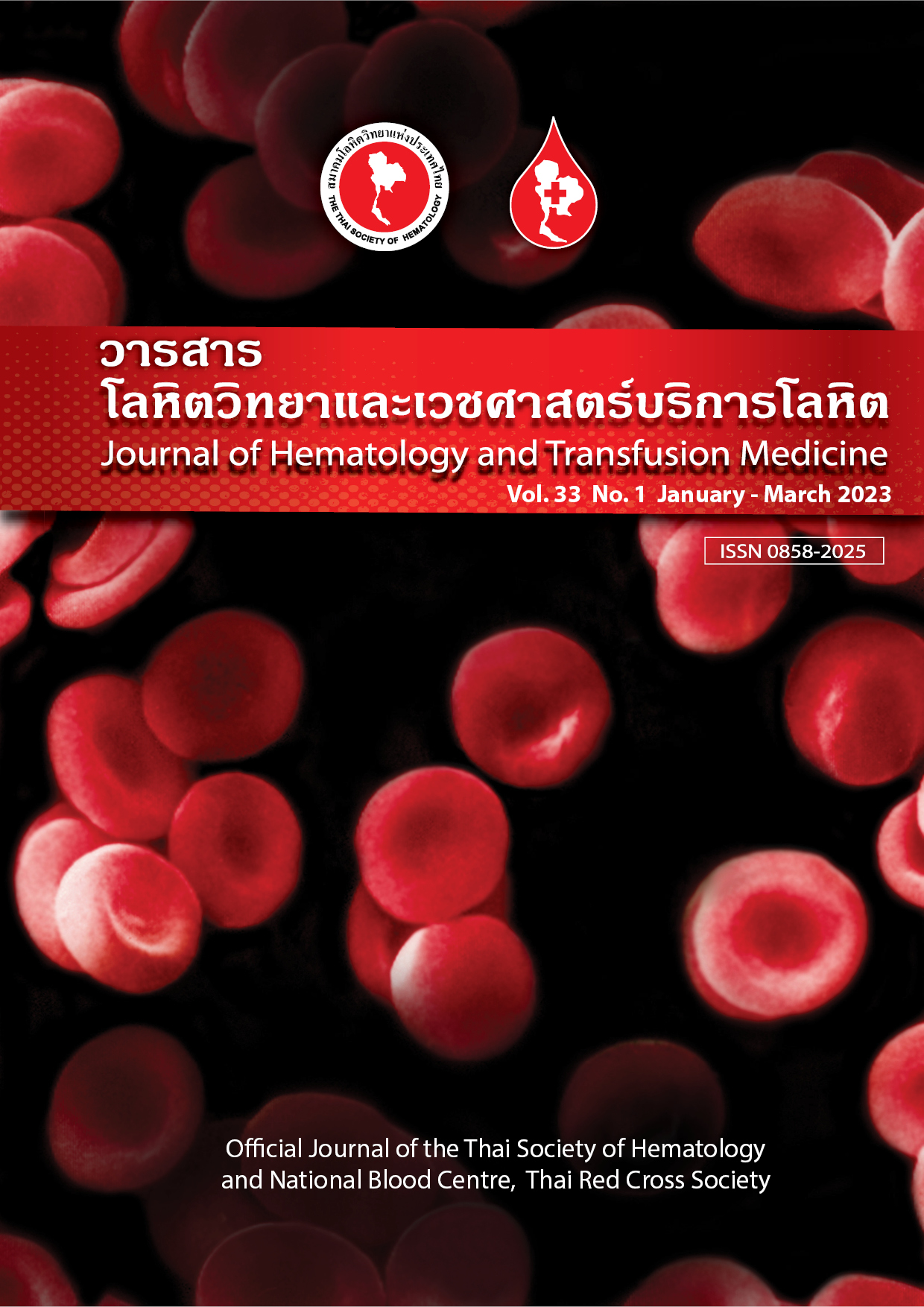Estimating duration of leucovorin rescue among patients with non-Hodgkin lymphoma receiving high dose methotrexate therapy
Keywords:
High dose methotrexate, Lymphoma, LeucovorinAbstract
Background: High dose methotrexate (HDMTX) regimen is used in lymphoma with central nervous system (CNS) involvement or as primary CNS prophylaxis. Serum MTX concentrations should be monitored by adjusting leucovorin rescue until reaching the target of < 0.05 μmol/L. However, monitoring MTX level is not feasible in many Thai hospitals. Objective: The study aimed to estimate the most appropriate duration of leucovorin rescue among patients with lymphoma receiving HDMTX. Methods: A retrospective chart review was conducted of patients with lymphoma receiving HDMTX regimen from January 2016 to December 2019. Baseline estimated glomerular filtration rate (eGFR) was categorized into 3 groups: (1) 30-59, (2) 60-89 and (3) ≥ 90 mL/min/1.73 m2. Patients developing acute kidney injury after HDMTX were excluded. Primary outcome was number of days from HDMTX administration to the MTX level of under 0.05 μmol/L (ΔDay0.05). Results: Sixty-six patients (23 in each eGFR category; 36 men), with mean age of 60±12 years were included. Median dose of HDMTX was 4.0 g/m2 (range 1.0-4.8). Factor significantly associated with ΔDays0.05 was baseline eGFR category (p < 0.001). Mean ΔDay0.05 in group 1 (eGFR 30-59 mL/min/1.73 m2) was 6.7±1.7 day (range 4-10), in group 2 (eGFR 60-89) was 4.6±1.3 day (range 3-7), and in group 3 (eGFR ≥ 90) was 3.5±0.5 days (range 3-4). Conclusion: Our result showed that the estimated duration of MTX level under 0.05 μmol/L after HDMTX administration correlated with eGFR value. Notably, physicians could use this data for predicting the stopping date of leucovorin rescue at hospitals where monitoring MTX level was not feasible.
Downloads
References
Jolivet J, Cowan KH, Curt GA, Clendeninn NJ, Chabner BA. The pharmacology and clinical use of methotrexate. N Engl J Med. 1983;309:1094-104.
Bleyer WA. The clinical pharmacology of methotrexate: new applications of an old drug. Cancer. 1978;41:36-51.
Ackland SP, Schilsky RL. High-dose methotrexate: a critical reappraisal. J Clin Oncol. 1987;5:2017-31.
Howard SC, McCormick J, Pui CH, Buddington RK, Harvey RD. Preventing and Managing Toxicities of High-Dose Methotrexate. Oncologist. 2016;21:1471-82.
Abelson HT, Fosburg MT, Beardsley GP, Goorin AM, Gorka C, Link M, et al. Methotrexate-induced renal impairment: clinical studies and rescue from systemic toxicity with high-dose leucovorin and thymidine. J Clin Oncol. 1983;1:208-16.
Shen DD, Azarnoff DL. Clinical pharmacokinetics of methotrexate. Clin Pharmacokinet. 1978;3:1-13.
Garnick M, Mayer R, Abelson H. Acute renal failure associated with cancer treatment. In: Brenner BM, Lazarus JM, editors. Acute Renal Failure. New York: Churchill Livingstone; 1988. p. 621-657.
Pitman SW, Parker LM, Tattersall MH. Clinical trial of high-dose methotrexate (NSC-740) with citrovorum factor (NSC-3590)-toxicologic and therapeutic observations. Cancer Chemother Rep. 1975;6:43-9.
Wan SH, Huffman DH, Azarnoff DL, Stephens R, Hoogstraten B. Effect of route of administration and effusions on methotrexate pharmacokinetics. Cancer Res. 1974;34:3487-91.
Li J, Gwilt P. The effect of malignant effusions on methotrexate disposition. Cancer Chemother Pharmacol. 2002;50:373-82.
Levêque D, Santucci R, Gourieux B, Herbrecht R. Pharmacokinetic drug-drug interactions with methotrexate in oncology. Expert Rev Clin Pharmacol. 2011;4:743-50.
Aumente D, Buelga DS, Lukas JC, Gomez P, Torres A, García MJ. Population pharmacokinetics of high-dose methotrexate in children with acute lymphoblastic leukaemia. Clin Pharmacokinet. 2006;45:1227-38.
Kintzel PE, Dorr RT. Anticancer drug renal toxicity and elimination: Dosing guidelines for altered renal function. Cancer Treat Rev. 1995;21:33-64.
Aronoff GR, Berns JS, Brier ME, Golper TA, Morrison G, Singer I, et al, eds. Drug prescribing in renal failure: dosing guidelines for adults. Philadelphia: American College of Physicians; 1999.
Kristensen LO, Weismann K, Hutters L. Renal function and the rate of disappearance of methotrexate from serum. Eur J Clin Pharmacol. 1975;8:439-44.
Sand TE, Jacobsen S. Effect of urine pH and flow on renal clearance of methotrexate. Eur J Clin Pharmacol. 1981;19:453-6.
Downloads
Published
Issue
Section
License
Copyright (c) 2023 Journal of Hematology and Transfusion Medicine

This work is licensed under a Creative Commons Attribution-NonCommercial-NoDerivatives 4.0 International License.



